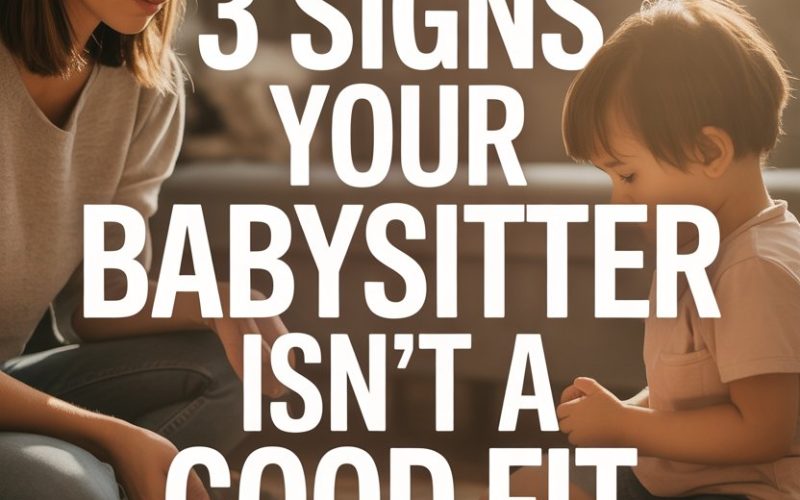Finding a great babysitter sometimes feels like searching for a unicorn—magical, elusive, and possibly only real in fairy tales. But when life (or your calendar) insists you need a little help, you might settle for the ‘good enough’ option.
Here’s the rub: not every sitter is a match for your family, and sometimes the red flags are more subtle than you’d expect.
Let’s cut to the chase. Here are three glaring (and a few sneaky) signs your babysitter isn’t a good fit—and what you can do about it before your next date night turns into a stress fest.
1. The Communication Conundrum
Ever come home to discover your child’s bedtime story involved a surprisingly detailed retelling of Jurassic Park, or find out via a cryptic text that “everything’s fine, lol”? Jokes aside, communication is everything.
A good sitter keeps you updated without flooding your phone like a weather app in monsoon season. They tell you if the pasta made a reappearance on the lounge carpet, or if your toddler managed to scale the bookshelf.
You get the lowdown on moods, meals, and milestones—big or small.
A not-so-great fit? They might ghost you for hours, respond with emojis only, or give you a play-by-play that sounds suspiciously like a job interview.
Maybe you’re left piecing together what really happened from the pile of cracker crumbs on the coffee table.
When communication feels off, trust your instincts. Parenting expert Dr. Laura Markham reminds us that reliable updates build trust and help bridge those moments you’re not physically present.
If your babysitter’s updates are either non-existent or resemble a cryptic crossword, you might have a problem.
What to try:
Set clear expectations around communication before heading out—text updates at certain times, a quick summary at the end of the night, or a call if anything seems off.
If you’re already doing this and still feeling like Sherlock Holmes piecing together the evening, it may be time to move on.
2. The Consistency Gap
You ask for screen-free play. You come home to find Peppa Pig on loop and your little one reciting every episode by heart. Or, your carefully labelled snacks are untouched because the sitter decided a handful of marshmallows was a more “creative” lunch.
Every family has its quirks and non-negotiables. An ace babysitter respects them, even if they occasionally think your rules about matching socks are a bit much.
Trouble starts when your sitter’s idea of “flexible” means ignoring your requests. Maybe they show up late (again), forget about an allergy, or let your five-year-old try out the glue gun.
These lapses can feel frustrating at best and downright alarming at worst. Children thrive on routine (as much as adults might secretly loathe it), and when your sitter tosses your carefully crafted schedule to the wind, everyone feels the fallout.
Research from Zero to Three backs up what frazzled parents know in their bones: consistency and routine help kids feel safe and secure.
If your sitter can’t stick to the basics—or at least notify you when something has to change—you’re right to question the fit.
What to try:
Have a chat. Maybe your sitter misunderstood what “bed at seven” actually means. If things don’t improve after a clear conversation, don’t hesitate to start your search again. Your sanity (and your sofa cushions) deserve better.
3. The Gut-Check Fail
Now for the trickiest one: that uneasy, can’t-put-your-finger-on-it feeling. Your child seems off after the sitter leaves, or you catch a whiff of something that doesn’t sit right—figuratively or literally (hello, mysterious smell of burnt popcorn).
Gut feelings are a parent’s superpower. Maybe your little one clings to you a bit longer after a sitting session, starts dreading “babysitter days,” or suddenly develops a new obsession with hiding under the dining table.
Small children don’t always have words for their worries, but they’re experts at showing how they feel.
Research highlighted by Harvard’s Center on the Developing Child shows that stable, responsive relationships are the bedrock of early childhood development.
If your sitter doesn’t seem invested in connecting with your child, shows little warmth, or avoids your questions, don’t shrug it off.
And what about you? Are you finding yourself dreading leaving the house or skipping much-needed plans because the sitter’s coming? That’s a clue.
What to try:
Trust yourself. Have an open, non-confrontational conversation with your sitter (or agency), and check in with your child in age-appropriate ways. Ask open-ended questions, watch for changes, and connect with other parents who’ve used the sitter.
No one gets it right every time—but you’re the expert on your own family.
Don’t Ignore the Small Stuff
It’s tempting to brush off minor annoyances—late arrivals, missed texts, or odd snack choices. Everyone has an off day, and life with kids is nothing if not unpredictable.
But if these irritations start to add up, or if you’re feeling more anxious every time you book the sitter, it’s worth reevaluating.
Babysitting isn’t just about keeping the chaos to a dull roar. The right sitter will make both you and your children feel safe, respected, and valued.
If you’re not getting that, keep looking. Your peace of mind—and your child’s well-being—are worth it.
And who knows? Maybe that babysitter unicorn is just around the corner, armed with glue-free crafts and a deep respect for your bedtime routine.




